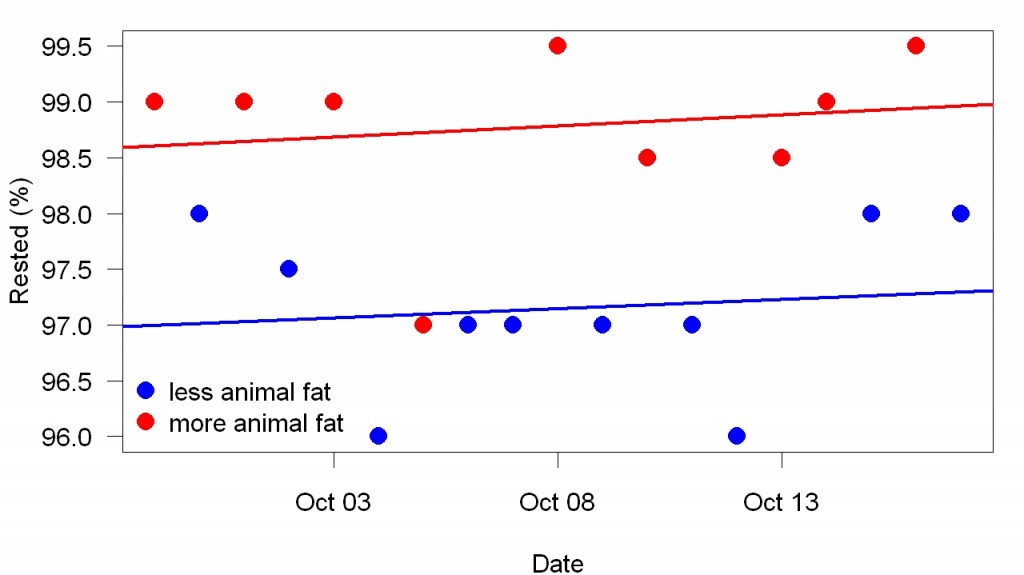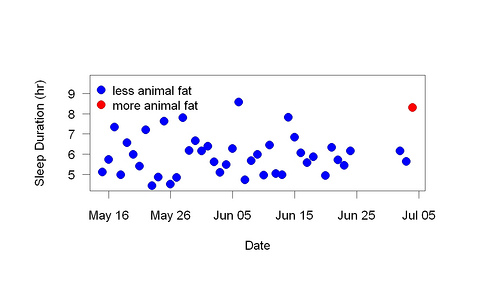After I wrote about eating a lot of pork fat and sleeping better, David Shackelford commented that he had had a similar experience: After he started eating much more animal fat and meat, he too slept better. (He posted about this before he read my post.) I asked him for details. He answered:
About three weeks ago, I started a carnivorous diet. I did this primarily for its supposed benefit to insulin sensitivity, energy levels, and general health, and also because I wanted to see if it was really possible to thrive on nothing but meat.
Immediately after starting, I noticed that I was sleeping easier, longer, and deeper, and having more vivid dreams than usual. I’ve had a hard time falling asleep for my entire life, usually taking 45 minutes to two hours after going to bed, and occasionally not being able to sleep at all, so this was a very pleasant surprise.
At first I thought that this was due to standing on one foot, which I had started a few days prior, but I stopped one-foot-standing and the effect persisted. The all-meat diet has been pretty great all around-food is delicious, I’ve got a ton of energy, and I’m rarely hungry-but the sleep has been the best part.
Me
21 years old (senior in college)
130-ish lbs
5’4″
12-15% body fat
Moderately active, fairly good shape.My diet
-Breakfast of 3-4 egg omelette, with 1-2 oz cheese and occasionally bacon.
-Lunch: chicken breast, sausage, or eggs.
-Dinner: 1lb+ steak.
-Snacks: nuts and/or cheese.Approximate macronutrient composition
Before: 50% carbohydrate / 30% protein / 20% fat (at least half unsaturated olive oil)
After: 60-70% fat (all animal fat), 30-40% protein;10% carbohydrates (nuts and the occasional glass of wine, plus trace amounts in sauces and cheeses). Unsure of my caloric intake; I think it varies between 1500 and 2000 a day.Other
-I cook chicken, beef, and eggs in butter.
-I drink coffee 1-2 times a day, and tea about once a day.
-I take a multivitamin (I don’t know why), 5,000 IU Vitamin D (I live in Oregon, which gets very little sunlight), and 2.5g fish oil (the grain-fed beef I eat has low 3:6 ratios; if I could afford grass-fed, I probably wouldn’t need the fish oil).
-I let the diet go on weekends, for the sake of social life. I probably have 3-5 drinks on Friday and Saturday night, as well as some junk food (pizza/chips/fries). I feel like I don’t sleep quite as well on these days, but there are so many confounding variables (alcohol, staying up later than usual, seeing faces later into the night, sex) that isolating a cause of the difference is tough.Exercise
-I lift weights for about 30 minutes, twice a week.
-I go out social dancing for about four hours, once to twice a week.
-Sleep does not seem to vary with whether I exercise or not.
He blogs about this at meatsaur.us. His story is more evidence that the animal fat/sleep connection is cause and effect (animal fat –> better sleep), and suggests that the effect is not limited to me.

